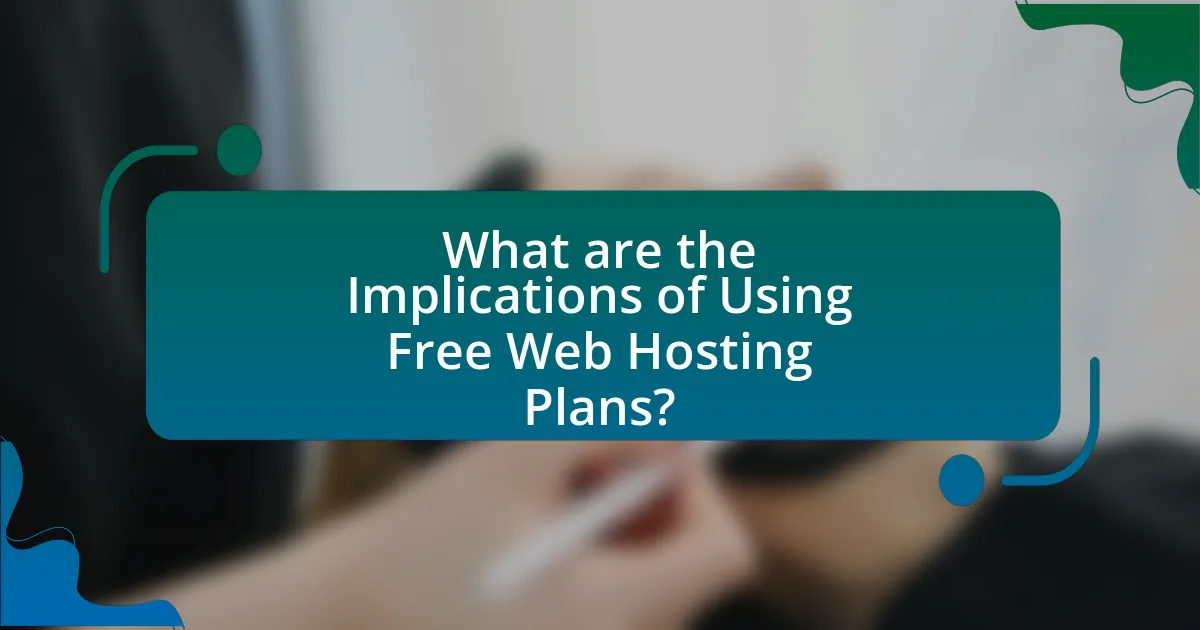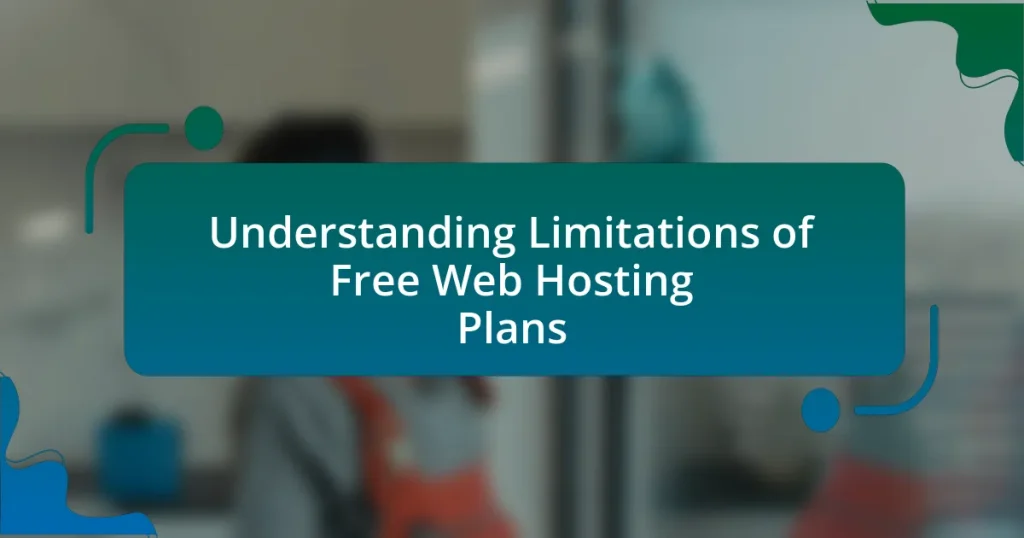Free web hosting plans present several limitations that can significantly impact website performance and user experience. These limitations include restricted storage space, limited bandwidth, lack of customer support, and the presence of advertisements, which can detract from a site’s professionalism. Additionally, free hosting often lacks essential features such as custom domain names and SSL certificates, raising security concerns and affecting credibility. The article explores how these constraints differ from paid hosting options, the implications for website growth and SEO, and the potential legal issues users may face. It also discusses alternatives to free hosting, emphasizing the benefits of low-cost paid plans that offer enhanced features and support.

What are the Limitations of Free Web Hosting Plans?
Free web hosting plans have several limitations, including restricted storage space, limited bandwidth, and lack of customer support. These plans often provide minimal resources, which can hinder website performance and scalability. For instance, many free hosting services impose a cap on storage, typically ranging from 500 MB to 2 GB, which can be insufficient for growing websites. Additionally, bandwidth limitations can lead to slow loading times or downtime during traffic spikes, as many free hosts offer only a few gigabytes of monthly data transfer. Furthermore, free hosting often lacks essential features such as custom domain names, SSL certificates, and professional email accounts, which can affect credibility and security. Lastly, users may encounter advertisements placed by the hosting provider on their sites, detracting from the user experience and brand image.
How do free web hosting plans differ from paid options?
Free web hosting plans differ from paid options primarily in terms of features, performance, and support. Free plans typically offer limited storage, bandwidth, and functionality, often including advertisements on hosted sites, while paid options provide greater resources, enhanced security, and customer support. For instance, a study by HostingAdvice in 2021 indicated that paid hosting services can offer up to 99.9% uptime, compared to the often lower reliability of free services. Additionally, paid plans usually allow for custom domain names, which enhances branding, whereas free plans often require the use of subdomains.
What features are commonly restricted in free web hosting plans?
Free web hosting plans commonly restrict features such as storage space, bandwidth, and customer support. These limitations often include a cap on the amount of disk space available for files and databases, which can hinder website growth. Additionally, bandwidth restrictions can lead to slow loading times or downtime during high traffic periods. Customer support is typically minimal or non-existent, leaving users to troubleshoot issues independently. Furthermore, free plans may impose limitations on the use of custom domain names, email accounts, and access to advanced features like SSL certificates or website builders, which are essential for professional online presence.
How do resource limitations impact website performance?
Resource limitations significantly degrade website performance by restricting the availability of essential computing resources such as bandwidth, storage, and processing power. When a website operates under constrained resources, it may experience slower load times, increased latency, and reduced responsiveness, leading to a poor user experience. For instance, a study by Google found that a one-second delay in loading time can lead to a 20% decrease in user satisfaction and a 7% reduction in conversions. Additionally, limited bandwidth can cause bottlenecks during high traffic periods, resulting in downtime or errors, which further impacts user engagement and retention.
Why are advertisements prevalent in free web hosting services?
Advertisements are prevalent in free web hosting services because these services need to generate revenue to sustain their operations. Free web hosting providers often lack the financial resources to offer their services without some form of monetization. By displaying advertisements, they can earn income from advertisers who pay to reach the user base of the hosting service. This model allows users to access hosting services at no cost while enabling the provider to cover expenses such as server maintenance, bandwidth, and customer support. The reliance on advertisements is a common practice in the industry, as it creates a balance between offering free services and maintaining financial viability.
What types of ads can users expect on free hosting plans?
Users on free hosting plans can expect various types of ads, primarily banner ads, pop-up ads, and interstitial ads. These advertisements are typically displayed on users’ websites to generate revenue for the hosting provider, as free plans often lack direct monetization options for users. For instance, many free hosting services utilize third-party ad networks to serve these ads, which can disrupt user experience and affect website aesthetics.
How do ads affect user experience and website credibility?
Ads negatively impact user experience and website credibility by creating distractions and reducing trust. Users often find intrusive ads annoying, leading to a higher likelihood of ad-blocking and decreased engagement with the content. A study by the Interactive Advertising Bureau found that 70% of users reported frustration with online ads, which can diminish their overall experience on a website. Furthermore, excessive or poorly placed ads can make a site appear unprofessional, undermining its credibility. Research from Nielsen indicates that websites with fewer ads are perceived as more trustworthy, highlighting the importance of ad management in maintaining user trust and satisfaction.
What security concerns are associated with free web hosting?
Free web hosting poses significant security concerns, primarily due to inadequate protection measures. Users often face risks such as data breaches, as free hosting services may lack robust encryption and security protocols, making sensitive information vulnerable to unauthorized access. Additionally, free web hosts frequently have limited resources to monitor and respond to security threats, increasing the likelihood of malware infections and hacking attempts. According to a study by the Cybersecurity & Infrastructure Security Agency, free hosting platforms are more susceptible to attacks because they attract malicious actors seeking easy targets. Furthermore, users may not have control over their data, as free hosting providers can access and potentially misuse it, leading to privacy violations.
How does lack of support impact website security?
Lack of support significantly undermines website security by delaying the response to vulnerabilities and threats. Without timely assistance, website owners may not receive critical updates or patches, leaving their sites exposed to attacks. For instance, a study by the Ponemon Institute found that organizations with inadequate support experienced a 30% higher likelihood of data breaches due to unaddressed security flaws. This lack of proactive management can lead to increased risks, including data loss and compromised user information, ultimately damaging the website’s integrity and trustworthiness.
What vulnerabilities are common in free hosting environments?
Common vulnerabilities in free hosting environments include lack of security updates, limited customer support, and shared resources leading to potential data breaches. Free hosting services often do not prioritize regular security patches, making websites susceptible to exploits. Additionally, the absence of dedicated support can delay response times to security incidents. The shared nature of resources in free hosting can allow one compromised site to affect others on the same server, increasing the risk of cross-site scripting and other attacks. These factors collectively contribute to a higher likelihood of security incidents in free hosting environments.

What are the Implications of Using Free Web Hosting Plans?
Using free web hosting plans often results in limitations such as reduced performance, lack of customer support, and potential security vulnerabilities. These plans typically offer limited bandwidth and storage, which can lead to slow loading times and downtime, negatively impacting user experience and search engine rankings. Additionally, free hosting services frequently do not provide technical support, leaving users to troubleshoot issues independently. Security is also a concern, as free hosts may not implement robust security measures, making websites more susceptible to hacking and data breaches. Furthermore, many free hosting services display advertisements on users’ sites, which can detract from the site’s professionalism and user engagement.
How can limitations affect website growth and scalability?
Limitations can significantly hinder website growth and scalability by restricting resources such as bandwidth, storage, and processing power. For instance, free web hosting plans often impose strict limits on these resources, which can lead to slow loading times and downtime during traffic spikes. According to a study by Google, a one-second delay in page load time can result in a 20% decrease in conversions, illustrating how performance limitations directly impact user engagement and revenue potential. Additionally, limited technical support and lack of advanced features can prevent websites from implementing necessary upgrades or optimizations, further stunting growth and scalability.
What challenges do users face when upgrading from free to paid plans?
Users face several challenges when upgrading from free to paid plans, primarily related to cost, feature understanding, and migration difficulties. The cost can be a significant barrier, as users may be hesitant to commit to ongoing expenses without fully understanding the value of the paid features. Additionally, users often struggle to comprehend the differences between free and paid plans, leading to confusion about which features are essential for their needs. Migration from a free plan to a paid plan can also pose technical challenges, such as data transfer issues or compatibility problems with existing content. These challenges highlight the need for clear communication from service providers regarding the benefits and processes involved in upgrading.
How do limitations influence SEO and online visibility?
Limitations significantly hinder SEO and online visibility by restricting essential features such as bandwidth, storage, and customization options. For instance, free web hosting plans often impose bandwidth caps, which can lead to slow loading times and downtime, negatively impacting user experience and search engine rankings. Additionally, limited storage can restrict the amount of content and media that can be hosted, reducing the site’s ability to provide valuable information to users and search engines alike. Furthermore, customization limitations prevent the implementation of SEO best practices, such as optimizing meta tags and URLs, which are crucial for improving search visibility. According to a study by Backlinko, page speed is a ranking factor, and sites that load slowly can see a drop in organic traffic, illustrating the direct correlation between hosting limitations and SEO performance.
What are the potential legal issues with free web hosting?
Free web hosting can lead to several potential legal issues, primarily related to copyright infringement, data privacy violations, and terms of service breaches. Users may unknowingly host copyrighted material without permission, exposing themselves to legal action from copyright holders. Additionally, free hosting services often have lax data protection measures, which can result in violations of privacy laws such as the General Data Protection Regulation (GDPR) in Europe, leading to significant fines. Furthermore, users may inadvertently violate the terms of service of the hosting provider, which can result in account suspension or legal disputes. These issues highlight the importance of understanding the legal implications associated with using free web hosting services.
What terms of service should users be aware of?
Users should be aware of several key terms of service when utilizing free web hosting plans. These terms typically include limitations on storage space, bandwidth, and the presence of advertisements on hosted sites. For instance, many free hosting services impose strict caps on the amount of data users can store and transfer, which can hinder website performance and accessibility. Additionally, users often agree to allow the hosting provider to display ads on their sites, which can detract from the user experience. Furthermore, terms may include clauses regarding the termination of services, where providers reserve the right to suspend or delete accounts that violate their policies. Understanding these terms is crucial for users to manage their expectations and avoid potential issues with their web hosting experience.
How can copyright and content ownership be affected?
Copyright and content ownership can be affected by the terms of service of free web hosting plans, which often include clauses that grant the hosting provider certain rights over user-generated content. These terms may allow the provider to use, modify, or distribute the content without the owner’s explicit consent. For instance, many free hosting services reserve the right to terminate accounts or remove content that violates their policies, which can lead to loss of ownership or control over the content. Additionally, if users do not retain copyright notices or fail to register their works, they may inadvertently forfeit their rights, as seen in cases where creators have lost claims to their content due to lack of proper documentation or agreements.

What Alternatives Exist to Free Web Hosting Plans?
Paid web hosting services are the primary alternatives to free web hosting plans. These services typically offer enhanced features such as greater storage capacity, improved security, and better customer support. For instance, companies like Bluehost, SiteGround, and HostGator provide various pricing tiers that cater to different needs, ensuring users have access to reliable uptime and performance. According to a 2021 survey by HostingAdvice, 70% of users reported that paid hosting significantly improved their website’s speed and reliability compared to free options.
What are the benefits of low-cost web hosting options?
Low-cost web hosting options provide affordability, making them accessible for individuals and small businesses. These options typically offer essential features such as domain registration, email accounts, and customer support at a fraction of the cost of premium services. For instance, many low-cost providers offer plans starting as low as $2 to $10 per month, which is significantly cheaper than higher-tier services that can exceed $30 monthly. Additionally, low-cost hosting often includes user-friendly interfaces and one-click installations for popular content management systems, facilitating ease of use for beginners. This combination of affordability and essential features makes low-cost web hosting an attractive choice for those starting online without a substantial budget.
How do budget-friendly plans compare to free hosting in terms of features?
Budget-friendly plans typically offer more features than free hosting. While free hosting often includes limited storage, bandwidth, and support, budget-friendly plans generally provide enhanced resources such as increased storage capacity, better bandwidth, custom domain names, and customer support. For instance, many budget-friendly hosting services include features like SSL certificates, email accounts, and website builders, which are often absent in free hosting options. This distinction is crucial for users seeking reliability and scalability for their websites, as budget-friendly plans cater to more professional needs compared to the basic offerings of free hosting.
What should users look for when choosing a low-cost hosting provider?
Users should look for reliability, performance, customer support, and scalability when choosing a low-cost hosting provider. Reliability is crucial, as it ensures minimal downtime; providers with at least 99.9% uptime guarantees are preferable. Performance is important, so users should check for fast loading speeds, ideally under 2 seconds, which can significantly impact user experience and SEO rankings. Customer support should be accessible and responsive, with options like live chat or phone support available 24/7. Lastly, scalability allows users to upgrade their hosting plans easily as their website grows, ensuring that the provider can accommodate increased traffic and resource needs without significant disruptions.
How can users maximize their experience with free web hosting?
Users can maximize their experience with free web hosting by selecting a provider that offers essential features such as sufficient bandwidth, storage, and customer support. Choosing a platform that allows for easy upgrades to paid plans can also enhance the experience, as it provides scalability when traffic increases. Additionally, utilizing website builders and templates provided by the host can simplify the design process, making it user-friendly for those with limited technical skills. Research indicates that 70% of users prefer platforms with integrated tools for SEO and analytics, which can further optimize their site’s performance. By leveraging these features, users can effectively navigate the limitations of free web hosting plans while still achieving their website goals.
What best practices can enhance performance on free hosting plans?
To enhance performance on free hosting plans, users should optimize website content and minimize resource usage. This can be achieved by compressing images, utilizing caching techniques, and reducing the number of plugins or scripts. For instance, image compression can decrease load times significantly, as unoptimized images can account for up to 60% of a webpage’s weight. Additionally, employing a content delivery network (CDN) can improve loading speeds by distributing content across multiple servers. These practices are essential because free hosting plans often have limited bandwidth and server resources, making efficient resource management crucial for maintaining website performance.
How can users mitigate security risks while using free hosting services?
Users can mitigate security risks while using free hosting services by implementing strong security practices such as using HTTPS, regularly updating software, and employing strong passwords. HTTPS encrypts data transmitted between the user and the server, reducing the risk of interception. Regular software updates patch vulnerabilities that could be exploited by attackers, while strong passwords prevent unauthorized access to accounts. Additionally, users should avoid sharing sensitive information and consider using a Virtual Private Network (VPN) for added security. These measures collectively enhance the security posture of users relying on free hosting services.


